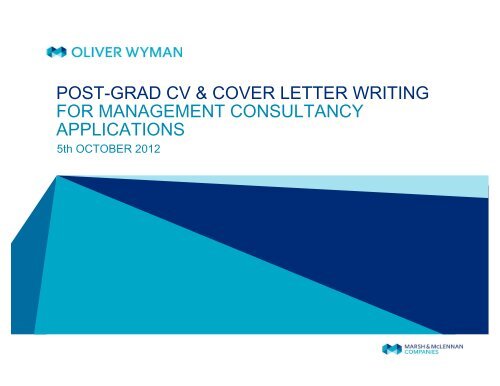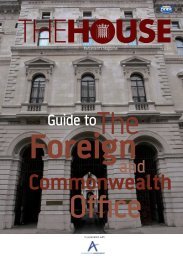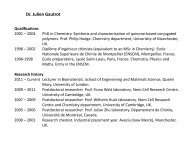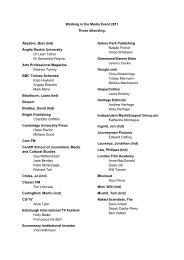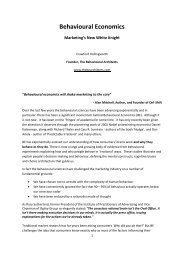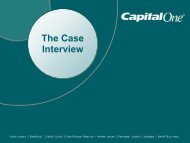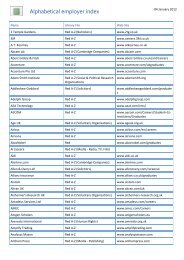Postgrad CV & Cover Letter Writing for Management Consultancy ...
Postgrad CV & Cover Letter Writing for Management Consultancy ...
Postgrad CV & Cover Letter Writing for Management Consultancy ...
Create successful ePaper yourself
Turn your PDF publications into a flip-book with our unique Google optimized e-Paper software.
POST-GRAD <strong>CV</strong> & COVER LETTER WRITING<br />
FOR MANAGEMENT CONSULTANCY<br />
APPLICATIONS<br />
5th OCTOBER 2012
Introduction<br />
Why invest the ef<strong>for</strong>t in <strong>CV</strong>s & <strong>Cover</strong> <strong>Letter</strong>s?<br />
• They are a key element in the recruitment processes of all consulting firms, and your<br />
“introduction” to each firm<br />
• Each consultancy receives 000’s of applications from very good people each year<br />
What will today’s session cover?<br />
• The aim of today is to show you how to best convey your suitability as a post-graduate<br />
applicant<br />
• Help you avoid some of the common mistakes made by PhD students when applying<br />
• By necessity, we will concentrate on Oliver Wyman’s approach and preferences, though the<br />
principles will hold true across most consultancies<br />
Please ask questions!<br />
If you have any specific questions about consulting or Oliver Wyman, please feel<br />
free to come and talk to any of us at the end of the session or go to<br />
www.oliverwyman.com/careers<br />
1
An introduction to the people you’ll meet today<br />
Quinton Goddard<br />
Senior Consultant<br />
PhD<br />
Astrophysics at Cambridge (2010)<br />
University<br />
Physics at Ox<strong>for</strong>d (2005)<br />
Oliver Wyman experience<br />
• Corporate & Investment Banking<br />
• Market Infrastructure<br />
• Public Policy<br />
Paul Rhatigan<br />
Senior Consultant<br />
PhD<br />
Nanoscience at Cambridge (2010)<br />
University<br />
Electrical Engineering at the University of<br />
Arizona (2004)<br />
Oliver Wyman experience<br />
• Finance and Risk<br />
• Quantitative Financial<br />
Philipp Studer<br />
Consultant<br />
PhD<br />
Nanotechnology at University College<br />
London (2011)<br />
University<br />
Electronic Engineering at ETH - Swiss<br />
Federal Institute of Technology (2008)<br />
Oliver Wyman experience<br />
• Joined OW Sep 2012<br />
2
The application process: What we are looking <strong>for</strong> (1/2)<br />
Throughout the process, applicants are assessed on three main criteria<br />
Segment A Segment B<br />
Segment C Segment D<br />
Problem solving skills Analytical and research skills<br />
Communication & personal skills<br />
• Problem structuring<br />
• Creative thinking<br />
• Business intuition<br />
• Find leverage – get to the heart of<br />
the problem<br />
• Explore implications – “So what”?<br />
• Quantitative analysis (e.g. graphs,<br />
tables)<br />
• Ask insightful qualitative questions<br />
• Work with limited facts<br />
• Clear, concise and articulate<br />
• Fit with our culture and our way<br />
of working<br />
• Poise and maturity<br />
• Leadership<br />
• Personal initiative<br />
• Self-management<br />
• Team-focused<br />
3
The application process: What we are looking <strong>for</strong> (2/2)<br />
Your PhD/post-grad course has equipped you with the required skills<br />
Segment A Segment B<br />
Segment C Segment D<br />
Problem solving skills<br />
• Designed own experiments &<br />
research<br />
• Found solutions and<br />
workarounds to problems<br />
• Drawn conclusions from your<br />
own results<br />
Analytical and research skills<br />
• Data handling<br />
• Use of computer modeling<br />
• Extracting important results<br />
from data<br />
• Finding the ‘so what’ in your<br />
results<br />
• Ability to learn independently<br />
Communication & personal<br />
skills<br />
• Presented at talks and<br />
conferences<br />
• Written academic papers<br />
• Worked as a tutor or lab<br />
supervisor<br />
• Managed a small team or lab<br />
group<br />
• Setup conferences<br />
4
<strong>Writing</strong> a <strong>CV</strong>: Content (1 of 2)<br />
While each <strong>CV</strong> is structured differently, they should ALL cover 3 key subjects<br />
Academics<br />
• PhD/Post-grad<br />
– Subject<br />
– Brief description<br />
• Qualifications and grades<br />
– University<br />
– A-levels<br />
• Prizes, scholarships, grants, etc..<br />
Other Experience<br />
• Extra-curricular experience e.g.<br />
– Positions of responsibility<br />
– Sports teams<br />
– Interesting travel<br />
– Etc.<br />
Work experience<br />
• Employment, internships, work<br />
experience<br />
– Dates<br />
– Responsibilities<br />
– Achievements & Relevance<br />
Languages (bonus)<br />
• Details of any language ability<br />
business fluent and above<br />
– Include evidence<br />
(e.g. lived abroad)<br />
• Details of any language study<br />
undertaken in own time<br />
5
<strong>Writing</strong> a <strong>CV</strong>: Content (2 of 2)<br />
For each topic, there are key steps you can take to convey your suitability<br />
clearly<br />
Academics<br />
• Give a clear and concise<br />
description of your PhD<br />
• Ensure relevant skills from your<br />
PhD come across<br />
• If you are an humanities student,<br />
try to give evidence of numeracy<br />
• Explain prizes, scholarships etc. if<br />
not clear<br />
Other Experience<br />
• Include experience that shows your<br />
personal drive<br />
• Avoid bland statements (e.g. “good<br />
interpersonal skills”)<br />
• Don’t include your life history – by<br />
all means include experience from<br />
e.g. school, but only <strong>for</strong> a very good<br />
reason<br />
Work experience<br />
• Space on the page should be<br />
proportional to importance<br />
• Include dates of all positions<br />
• If the employer is not well known –<br />
explain<br />
• Explain why the experience was<br />
valuable and what you brought to<br />
the role, not just what you did<br />
Languages (bonus)<br />
• Include details of any language<br />
study undertaken in own time, as<br />
evidence of personal drive<br />
• Don’t exaggerate – if you are not<br />
com<strong>for</strong>table doing business in your<br />
language, don’t claim you are…<br />
6
<strong>Writing</strong> a <strong>CV</strong>: Some key tips on <strong>for</strong>mat<br />
1 •<br />
2 •<br />
3 •<br />
4 •<br />
5 •<br />
Ensure your <strong>CV</strong> fits on 2 sides of A4<br />
– If you feel you are putting in “filler”, think about cutting down<br />
– Don’t include laundry lists of conferences attended or papers written – it is not an academic <strong>CV</strong>!<br />
Remember the person reading your <strong>CV</strong> will have many others to read<br />
– Use bullet points, rather than paragraphs<br />
– Use clear, intuitive <strong>for</strong>matting to make it as easy as possible <strong>for</strong> the reader<br />
Remember who your audience is<br />
– The reader may not be an expert in your field, make sure you remove any overly-technical<br />
language<br />
Quantify<br />
– Stating numbers when explaining your achievements gives a sense of scale<br />
– E.g. Ball committee chairman: Responsible <strong>for</strong> organising the college ball <strong>for</strong> over 600 guests<br />
with a budget of £55,000<br />
Check <strong>for</strong> silly errors!<br />
– Make absolutely sure there are no spelling and grammar issues<br />
– Ensure <strong>for</strong>matting is consistent throughout<br />
7
<strong>CV</strong><br />
8
<strong>Writing</strong> a cover letter: Some key tips<br />
Why do we ask <strong>for</strong> a cover letter?<br />
• A chance <strong>for</strong> the applicant to expand on key experiences and show more personality<br />
• Gives the applicant a chance to emphasise their suitability to the company and the area of<br />
work in which they are interested<br />
� Dos<br />
�<br />
Don’ts<br />
• Address the cover letter to the correct person<br />
(and the correct company!)<br />
– It’s on the website: no excuses!<br />
• Explain why you want to transition away from<br />
academia<br />
• Show you’ve done your research<br />
– Research the organisation and the job role<br />
be<strong>for</strong>e you apply<br />
• Keep the cover letter short: it should definitely fit<br />
on one page<br />
• Ensure spelling and grammar are 100% correct<br />
• Don’t be too self-centred<br />
– What can you do <strong>for</strong> us?<br />
• Don’t <strong>for</strong>get to answer key questions<br />
– Why are you applying <strong>for</strong> this job?<br />
– What marks you out from others?<br />
• Don’t waffle. “Filler” sentences are no good<br />
to us<br />
• Don’t overstretch yourself: keep it sensible and<br />
don’t use flowery metaphors<br />
9
<strong>Cover</strong>ing letter<br />
10
Examples of comments from other Oliver Wyman recruiters<br />
“He seemed very intelligent, and had done very well in his case interview.<br />
However, there was nothing else on the <strong>CV</strong>, such as work experience,<br />
hobbies, interests, team sports, etc. to indicate he ever did anything out<br />
of the Lab.<br />
The interview was rather hard work, as you can imagine, and despite his<br />
excellent case score, we didn’t take him through to the second round”<br />
“A 4 page <strong>CV</strong> with 2 pages listing academic presentations and papers.<br />
This clearly shows no understanding/appreciation <strong>for</strong> what we're looking<br />
<strong>for</strong> in an applicant”<br />
“ I think my takeaway is that you don’t have to try too hard to show you<br />
are ‘business-minded’- there really is no such thing. What we look <strong>for</strong> are<br />
smart, analytical, and social people. You can be a nerd and satisfy all<br />
these criteria and be an excellent consultant.”<br />
“If they can, demonstrate their ability to summarise complex in<strong>for</strong>mation<br />
by explaining to me, in one sentence on the cover letter or <strong>CV</strong> what the<br />
PhD is about, I’m impressed.”<br />
11
What’s the application process <strong>for</strong> Oliver Wyman?<br />
Apply online<br />
Assessment tests<br />
First round interviews<br />
(Cambridge)<br />
Final round interviews<br />
(London)<br />
Summer consultant<br />
applications<br />
• www.oliverwyman.com/careers<br />
• Apply by 1 November 2012 <strong>for</strong> pre-Christmas offers<br />
• Apply by 16 December 2012 <strong>for</strong> post-Christmas offers<br />
• Pre-Christmas: 8 November 2012<br />
• Post-Christmas: 14 January 2013<br />
• Pre-Christmas: 20 November 2012<br />
• Post-Christmas: 22 January 2013<br />
• Pre-Christmas: 23 November 2012<br />
• Post-Christmas: 25 January 2013<br />
• Closing date 20 January 2013<br />
• Tests and Interviews in February 2013


